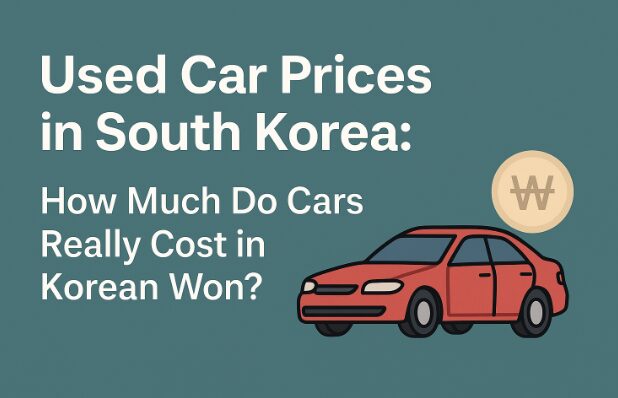If you’re living in South Korea or planning to import a car from the country, it’s important to understand how the used car market works—and more importantly, how much you should expect to pay. From compact city cars to luxury sedans, South Korea offers a wide range of used vehicles at relatively affordable prices compared to many Western countries. In this guide, we break down the average costs (in Korean won), key factors that affect pricing, and how to shop smart as a foreigner.

Why used car prices in Korea are unique
South Korea has one of the fastest vehicle turnover rates in the world. Most car owners replace their vehicles within 3 to 5 years, which means the used car market is full of recent models with low mileage. Cars are also subject to mandatory inspections and are generally well maintained.
Depreciation is steep for Korean cars. Domestic brands like Hyundai and Kia lose value quickly, while imported vehicles tend to retain higher resale prices due to high import taxes and brand reputation.
Average used car prices by type (in KRW)
Here are general price ranges for different categories of used cars in Korea. These figures are based on listings from popular platforms like K Car and Encar, as of 2024.
Compact cars (e.g. Kia Morning, Chevrolet Spark)
Price range: 3,000,000 – 7,000,000 KRW
Compact vehicles are perfect for city driving. They’re affordable, fuel-efficient, and easy to maintain. They’re a top choice for students or budget-conscious buyers.
Mid-size sedans (e.g. Hyundai Avante, Kia K5)
Price range: 7,000,000 – 15,000,000 KRW
This segment is favored by small families and daily commuters. The Hyundai Avante (Elantra) and Kia K5 are popular for their comfort, fuel economy, and strong resale value.
SUVs (e.g. Hyundai Tucson, Kia Sportage)
Price range: 12,000,000 – 25,000,000 KRW
SUVs are in high demand, especially in suburban and rural areas. AWD features and trunk space make them ideal for longer drives and family outings.
Luxury cars (e.g. Genesis G80, BMW 5 Series)
Price range: 25,000,000 – 50,000,000+ KRW
Domestic luxury brands like Genesis are very competitive in Korea. Foreign brands like BMW or Mercedes tend to be more expensive due to taxes, but used models still offer value compared to international markets.
Electric vehicles (e.g. Hyundai Ioniq 5, Kia EV6)
Price range: 18,000,000 – 45,000,000 KRW
EVs are growing in popularity, and Korea’s charging infrastructure is well developed. Prices vary depending on battery health, age, and whether government subsidies were applied.
What affects used car prices in Korea?
Several factors influence the pricing of used cars in Korea:
Mileage: Under 60,000 km is considered low and fetches higher prices.
Vehicle year: Newer models with modern features are more expensive.
Accident history: A clean history significantly increases value.
Fuel type: Diesel cars are cheaper; hybrids and EVs cost more.
Transmission: Automatic is standard; manual is rare and usually cheaper.
Color: White, black, and gray are more desirable and thus pricier.
Where to check prices and listings in Korean won
The best way to get a feel for market pricing is to browse platforms like:
K Car: Certified used cars with warranty
Encar: Largest online marketplace
Autowini: Focused on export buyers with English support
Use Google Chrome’s auto-translate feature if you’re not fluent in Korean. Most listings will clearly show the price in KRW, mileage, year, and whether the vehicle passed inspection.
Additional costs to consider when buying
Besides the car’s price, there are other costs you’ll need to factor in:
Acquisition tax: Typically 7% of the car’s value
Registration fee: Depends on your region
Insurance: Compulsory and priced by age, car model, and driving history
Inspection and maintenance: Required for older vehicles
Optional features: Dashcams, tinting, winter tires can add costs
Dealers may bundle some of these costs into their final quote, so ask for a breakdown before making a decision.
Tips for foreigners buying a used car in Korea
If you’re living in Korea as a foreigner, here’s what you’ll typically need:
Alien Registration Card (ARC)
Valid Korean driver’s license or international permit
Local bank account and Korean phone number
Proof of residence
Most large dealerships can assist with insurance and registration paperwork. If you’re not confident in Korean, consider bringing a Korean-speaking friend or using an expat-friendly broker.
What if you’re buying from outside Korea?
If you’re planning to import a Korean car to your home country, check out platforms like Be Forward or Autowini. They handle everything from inspection to shipping and customs paperwork. Just make sure your country allows imports from Korea and check for emission standards and tax requirements.
Comparing platforms: local vs. export-focused
| Platform | Best For | Language Support | Delivery |
|---|---|---|---|
| K Car | Domestic buyers | Korean only | Yes (within Korea) |
| Encar | Wide selection | Korean only | Varies by seller |
| Autowini | Export buyers | Full English | International |
| Be Forward | Global export | Full English | International |
Understanding price trends and future resale value
In general, Korean cars depreciate quickly in the first 3 years, then more slowly after that. Buying a car that’s 3–5 years old gives you the best balance of reliability and value. If you’re planning to resell the car within Korea later, keeping mileage low and service records updated will help retain its value.